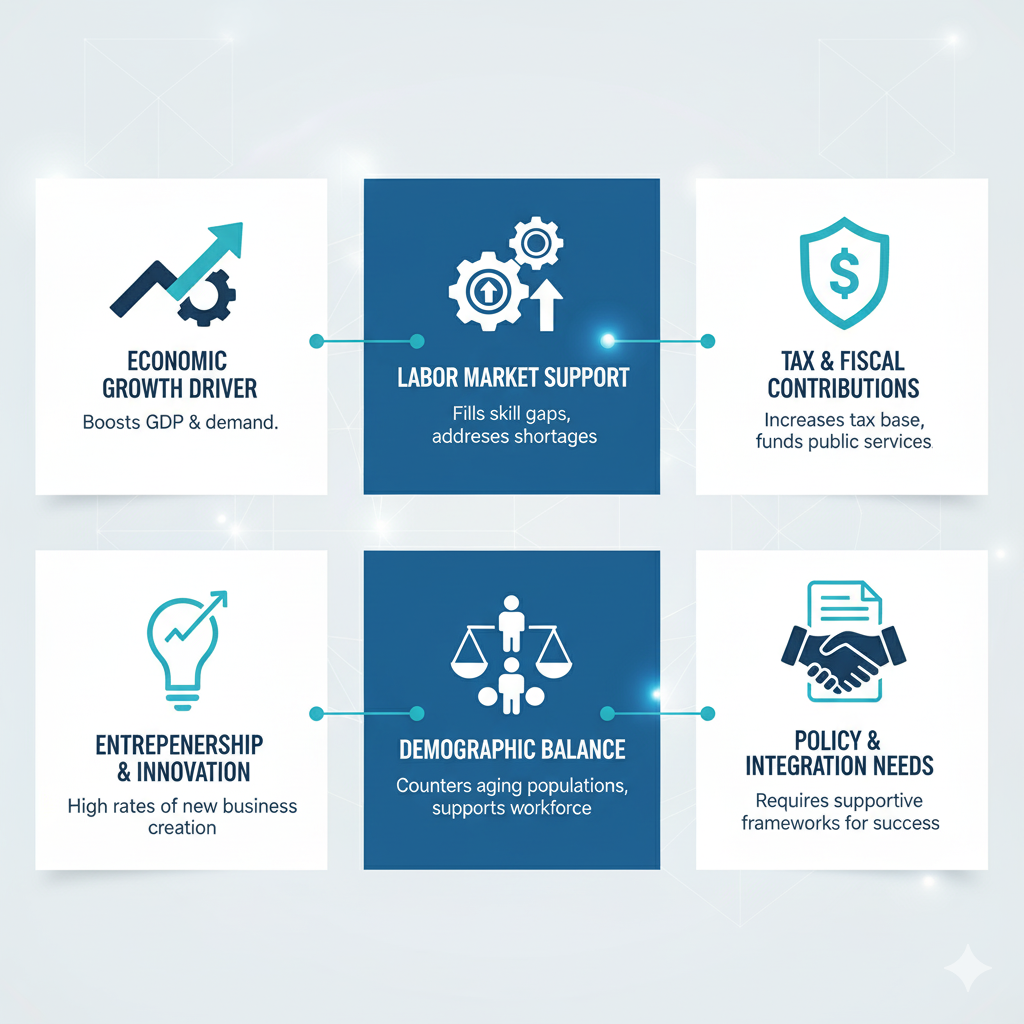A look at how immigration helps the economy with data
People have argued about whether immigration is good or bad for the economy at dinner tables, in politics, and in boardrooms. But there is a lot of evidence that immigration, when handled carefully, can be a powerful economic catalyst.
This isn’t just about the numbers on a spreadsheet. It’s about real businesses starting up, older people getting the care they need, and new ideas growing in places you wouldn’t expect. Understanding these changes is more important than ever, whether you’re a policymaker, a business owner, or just curious about how migration affects our economy.
Let’s look at what the data really says about the economic effects of immigration, including the pros and cons and the complicated truth that lies between the two extremes.
The Arc of History: Immigration as a Driver of Economic Growth
Throughout history, waves of immigrants have come to the US at the same time as periods of amazing economic growth. European immigrants helped the United States become an industrial power in the late 1800s and early 1900s. Australia’s post-war boom was fueled significantly by its migration programs. New Zealand’s economy has also benefited from smart immigration policies that were put in place to fix skill gaps.
These things are not random. Immigration brings new workers, new ideas, and the drive to start businesses that established populations often have trouble generating on their own. Immigrants don’t just take jobs that are already available; they also create demand for new goods and services, start businesses, and make the economy better for everyone.
What is the most important lesson from history? Economies that strategically welcome and integrate immigrants tend to do better than those that shut their doors.
Where Immigrants Create Economic Value
Contributions to the Labor Market
Immigrants fill critical gaps across the economic spectrum. In healthcare, immigrant nurses and doctors are very important, especially in rural and underserved areas. Many times, the construction, agriculture, and hospitality industries rely on immigrant workers to meet demand that domestic workers can’t meet.
But here’s what often gets overlooked: immigrants don’t just “take jobs.” Studies of the economy have shown time and time again that immigration boosts overall employment by boosting economic activity. When an immigrant chef sees a chance to open a new restaurant, that restaurant needs servers, managers, suppliers, and marketers. This creates jobs for people who were born in the US as well.
Effects on taxes and the economy
Immigrants pay a lot of taxes. They pay taxes on their income, sales, and property. Many also pay into social security systems even though they won’t be able to get benefits for years or even decades.
Studies from different OECD countries show that immigration usually has a positive or neutral effect on the economy over time. First-generation immigrants may need some public services, but their children, who go to school in the area and learn the local language, usually become high-earning taxpayers who give a lot more to the government than average.
Balance of Demographics
Many developed countries are facing a demographic crisis: their populations are getting older, and there aren’t enough people of working age to support them. One of the few practical solutions is immigration. Younger immigrants help keep the number of workers and retirees in balance, which helps keep pension systems going and pays for healthcare for older people.
New Zealand is a great example to look at. Without immigration, the country would have serious labor shortages in important areas and have a hard time keeping its social safety net as its population gets older.
The spirit of entrepreneurship and innovation
Innovation and entrepreneurship may be the most important ways that immigration changes the economy.
Businesspeople who are immigrants
In many countries, immigrants are more likely than native-born citizens to start businesses. Immigrants are almost twice as likely as Americans born in the country to start a business. These companies make jobs, encourage new ideas, and make local economies stronger.
Consider the many businesses that immigrants started or helped start, such as Google, Tesla, eBay, Yahoo, and many more. These aren’t just success stories; they’re economic powerhouses that hire hundreds of thousands of people and make billions of dollars in value.
Immigrants who start small and medium-sized businesses are just as important. The immigrant restaurateur, the construction company owner, the tech consultant—these entrepreneurs hire locally, pay taxes, and contribute to their communities in meaningful ways.
Research and Development
In many developed countries, immigrants make up a disproportionately large number of researchers, scientists, and engineers. They help with patents, academic research, and new technologies that make the economy more competitive.
Universities with a lot of international students get more citations, patents, and new research that changes the game. This new idea doesn’t just stay in labs; it spreads to the rest of the economy through new goods, services, and businesses.
Dealing with the Problems
When talking about immigration honestly, you have to talk about both the good and the bad things that come with it.
Displacement for a Short Time
In specific sectors or regions, immigration can create short-term wage pressure for certain worker groups. In some industries, native workers with low skills may have to compete with more skilled workers This effect tends to be modest and temporary, but it’s real for those affected.
Stopping immigration won’t solve the problem. Instead, we need to spend money on training, education, and support for workers who have to move. Combining open immigration policies with strong programs for developing the workforce helps make sure that everyone benefits from immigration.
Bringing people together and making them feel like they belong
When people move to a new country quickly without enough help to fit in, it can put a strain on social services and cause cultural tensions. Communities need time and money to help new people fit in.
Effective integration programs—language training, credential recognition, cultural orientation, and community-building initiatives—turn potential challenges into opportunities. Immigrants who are well-integrated help the economy and society more, which makes a virtuous cycle of prosperity.
Housing and Infrastructure
Because of immigration, the population is growing, which means we need to spend money on infrastructure, schools, and housing. Communities can be stressed without these investments.
However, it’s worth noting that immigrants themselves contribute to the tax base that funds these investments. The problem isn’t immigration itself; it’s making sure that government planning and spending keep up with the growing population.

Policy Strategies That Get the Most Benefits
Smart immigration policy can make the economy better while making problems less likely.
Skills-Based Systems With Flexibility
Balancing skilled immigration with family reunification and humanitarian commitments creates well-rounded programs. Skills-based components make sure that the needs of the labor market are met, while family and humanitarian streams uphold values and make communities that are diverse and dynamic.
Programs for immigration in different areas
Sending immigrants to areas with severe labor shortages helps spread the economic benefits more evenly. Regional visa programs encourage people to move to places where the population needs to grow the most.
Pathway to Permanent Residence
Giving immigrants clear paths to permanent residence and citizenship encourages them to invest in their communities, start businesses, buy homes, and settle down. All of these things create a lot of economic value.
Recognition of Credentials
Making sure that foreign credentials are properly recognized stops the waste of having trained professionals drive taxis or work in jobs that are much lower than their qualifications. Immigrants can do their best work when credential recognition processes are easier.
Integration Investment
Well-funded integration programs, such as language training, job placement services, and cultural orientation, are worth their weight in gold because they help immigrants become more involved in the economy and bring people together.
The Bottom Line on Immigration and Economic Growth
There is clear proof that immigration, when done with a plan and enough help for integration, makes economies stronger. It addresses labor shortages, drives innovation, balances demographics, and expands economic opportunity.
Are there problems that come up because of immigration? Yes, for sure. Are there costs as well as benefits? Yes, of course. But the overall effect, especially in the medium and long term, is clearly positive.
Countries that are doing well economically are usually the ones that welcome immigrants and invest in their integration. People who close their doors or don’t help newcomers lose a lot of money.







